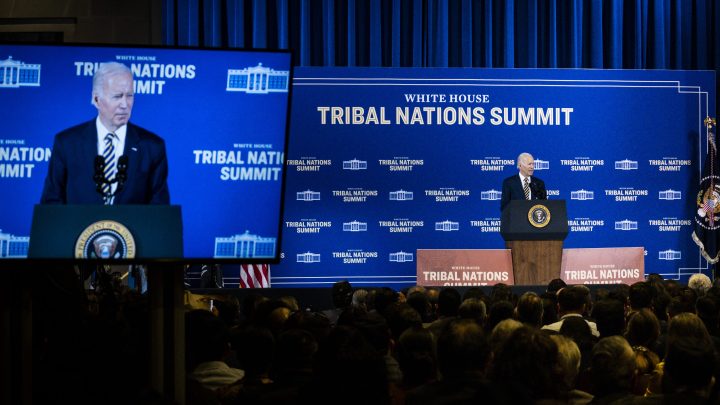
Tribes make progress in push to co-manage public lands

This week, hundreds of tribal leaders gathered in Washington for the White House Tribal Nations Summit. Lots of economic news came out of that event, including new federal money for tribal climate resilience and plans for the Energy Department to do more business with tribal nations.
There were also new commitments from the Biden administration on something Native leaders have been pushing for for a long time: tribal co-management of public lands, like national parks and forests.
The Karuk Tribe’s traditional territory spans a little over a million acres in what is now northwestern California.
But today, “98% of that is national forest system,” said Bill Tripp with the tribe’s natural resources department.
This year, Tripp said the tribe partnered with the U.S. Forest Service to reintroduce prescribed burning. “You know, what better place to look than to Indigenous communities and to overcome the historic injustice that surrounds this discussion?” he said.
The Karuk Tribe didn’t just hand over its territory in the 19th century — neither did any tribe whose ancestral land is now federally managed, said Andrew Curley, a professor of geography at the University of Arizona.
”A lot of it historically has been through violent removal of Indian nations from their traditional home bases,” Curley said.
This push for tribal co-management isn’t new, he added. But the Federal government’s willingness to engage definitely is.
The five tribes with ancestral ties to Bears Ears National Monument in Utah recently had a voice in conservation and development decisions.
“Our priorities are protecting sacred sites and minimizing visitor impacts,” said Lt. Gov. Carleton Bowekaty of the Zuni Tribe. “We’re making sure we’re involved every step of the way.”
The five tribes entered into a cooperative agreement with the Bureau of Land Management and the U.S. Forest Service in June and proposed a management plan for the monument in August.
”But the agencies aren’t actually required to adopt that input in any way or shape or form,” said Charissa Miijessepe-Wilson, with the Bears Ears Inter-Tribal Coalition. “They just have to consider it.”
Bill Tripp knows all about that. His department and the forest service have butted heads on burning regulations.
“The forest service doesn’t recognize our sovereign right to burn,” he said. But his tribe has a seat at the table now.
There’s a lot happening in the world. Through it all, Marketplace is here for you.
You rely on Marketplace to break down the world’s events and tell you how it affects you in a fact-based, approachable way. We rely on your financial support to keep making that possible.
Your donation today powers the independent journalism that you rely on. For just $5/month, you can help sustain Marketplace so we can keep reporting on the things that matter to you.

















